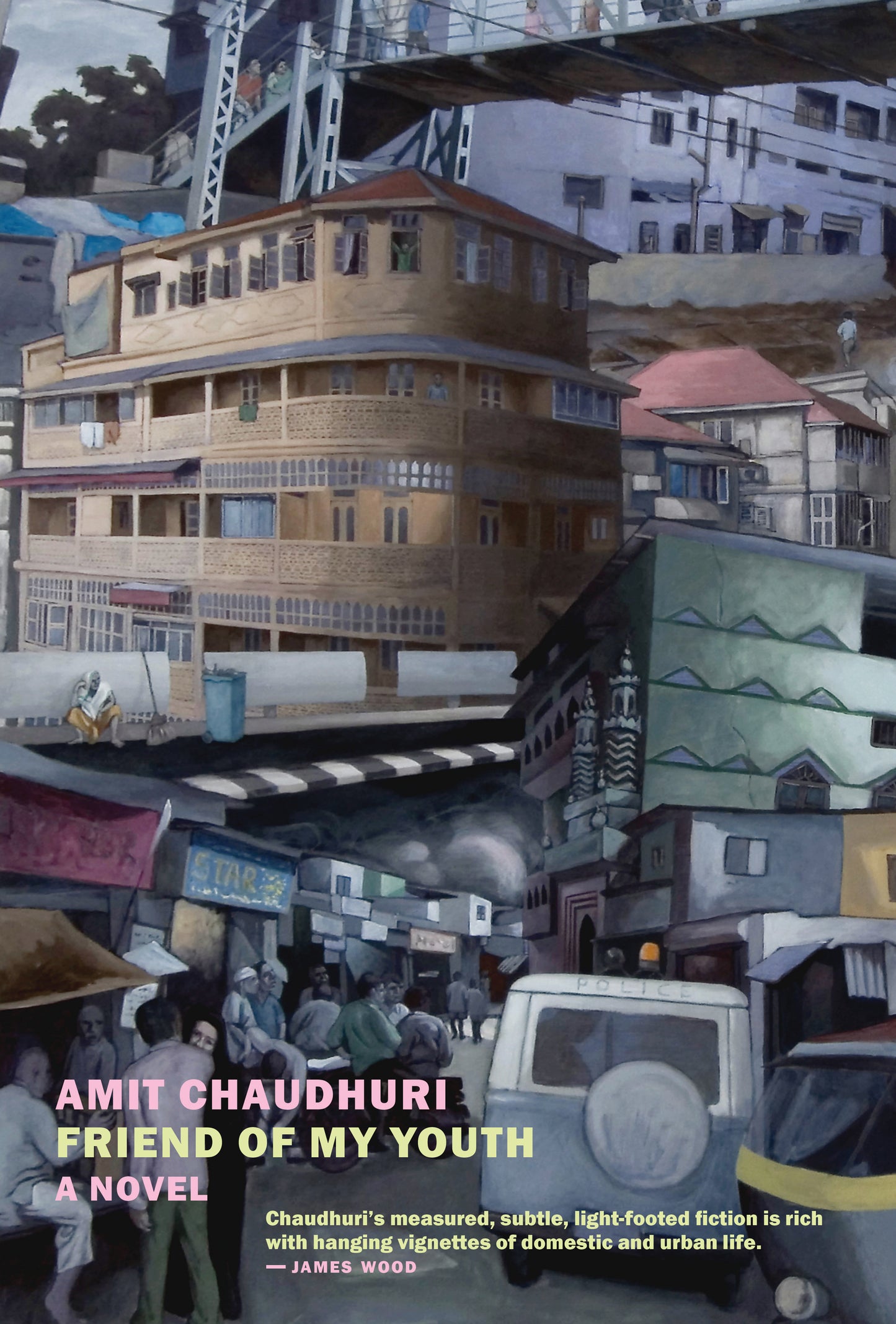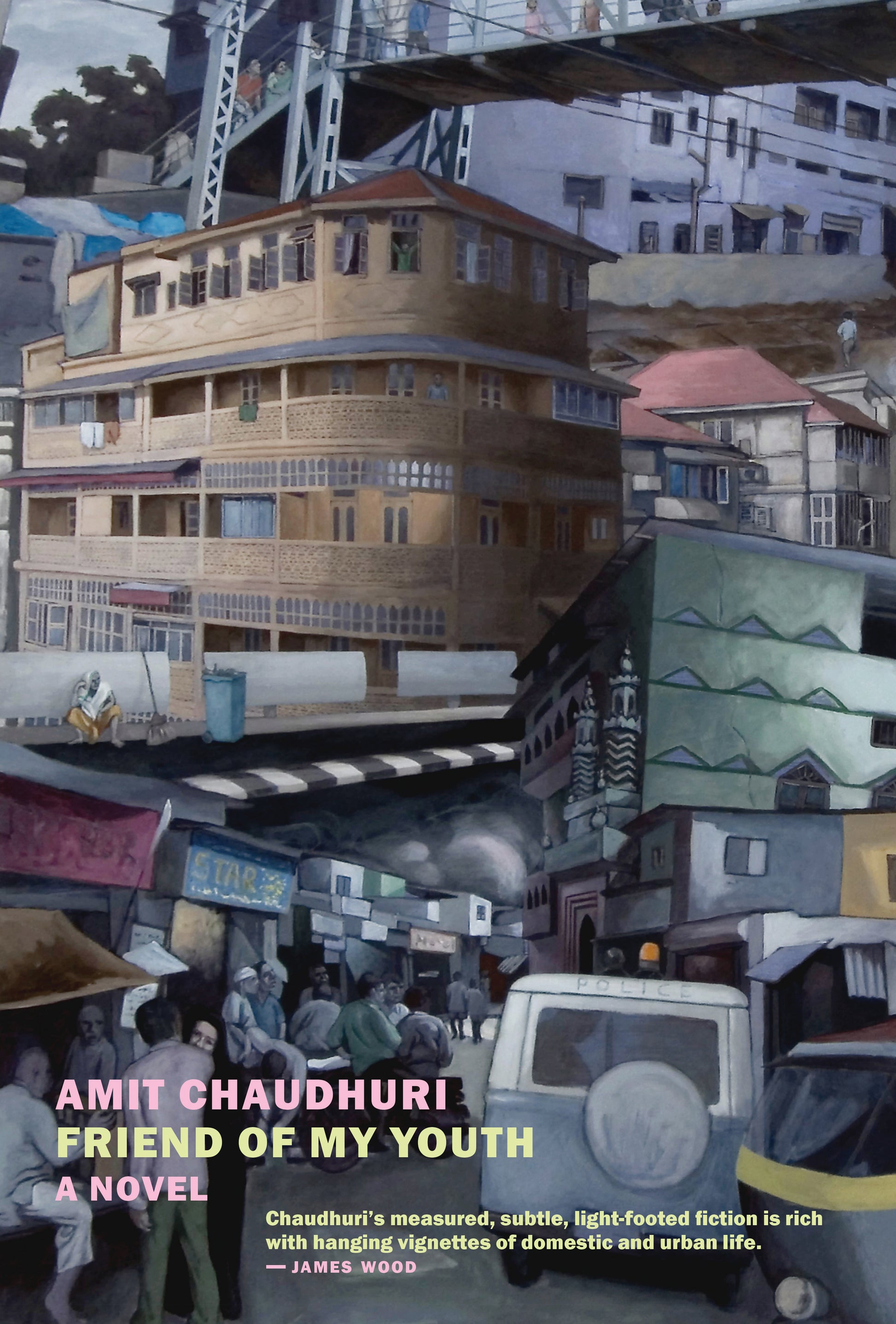Chaudhuri’s measured, subtle, light-footed fiction is rich with hanging vignettes of domestic and urban life.
— James Wood
With the publication of Friend of My Youth, Amit Chaudhuri is now the author of seven novels, greatly admired, especially by his peers . . . the drama of the self, spun from Chaudhuri’s meditations and recollections, is artfully composed and utterly absorbing.
—Kate Webb, Times Literary Supplement
Anything but a conventional novel, its pleasures arise from a craftsman’s writing and its subtle demands and rewards.
—Kirkus Reviews, starred review
A common, and false, complaint leveled against Chaudhuri by some critics is that nothing ever happens in his fiction. This is as untrue as saying that nothing ever happens in Waiting for Godot. He’s at his best with surfaces, stacking and overlaying them to create startling effects.
—Financial Times
To paraphrase a title of Proust’s, a writer Chaudhuri has been compared to often, this is a remarkable record of pasts recaptured that had never been free in the first place.
—Michael Autrey, Booklist
In this cogent and introspective novel, Chaudhuri movingly portrays how other people can allow individuals to connect their present and past.
—Publishers Weekly
A mini masterpiece. A really beautiful book. I love his honest, unsparing descriptions of himself, his weird, off-beat, unapologetic persona.
—Financial Times, Everything Else podcast
What [Chaudhuri] does in this short novel, with exquisite delicacy, is show disconnection, vacancy and the physical world’s imperviousness to human action, even of the most violent kind.
—Esquire (UK)
Friend of My Youth is a taut, efficient book: part novel and part manifesto. It presents itself as a work of fiction about friendship, the experiences of youth and the city of Mumbai, but really it’s a kind of anti-novel: a book about the failures of fiction to account for the realities of memory.
—The Guardian
Chaudhuri is an exceptionally subtle writer, a skeptical seeker rather than a postmodern show-off. However you classify it, this journey through the traces of his past earns its literary sleight-of-hand. . . . In a book that (in a good sense) marks time, the narrator prepares for his next ‘leap of life’. Like Benjamin’s Angel of History, which Chaudhuri does credit, these elegiac ruminations look backwards but move forwards.
—The Spectator
This novel is ‘an assemblage of moments, of different kinds of awareness of the world, and even of writing.’ Like [Henry] Green’s novels it offers delight, it shimmers, you seek to catch hold of it and it slides away.
—The Scotsman
[The narrator] remains unmoved by the memories Bombay evokes yet experiences an unsettling homesickness, a paradoxical state that is compellingly observed. He also likes to eat: miniaturist descriptions of the evolving food landscape are pin-sharp. The autofictional riffs are unshowy, often funny, and it all comes together as a textured reflection on the hold of the past.
—Francesca Angelini, Sunday Times
Fiercely intelligent . . . elegant. [Chaudhuri] combines a serious reflection on psychology and friendship with an examination of the artist’s relationship to real life.
—The Herald
What [Chaudhuri’s] work exemplifies is somebody who views the canon as everything, that there isn’t a form of canonical literature that makes him cleave to one culture or the other.
—Will Self
I realized that I had no terms in my critical lexicon to communicate the delight and the pleasure that his writing had given me. I haven’t encountered such joyous and playful writing about walking or eating . . . as I have in Chaudhuri’s books.
—Sumana Roy, Los Angeles Review of Books
Amit Chaudhuri is a master. This book is a hymn to our present and our past. In today’s noisy world, Chaudhuri’s words provide a home wherein we can contemplate the essential things in life.
—Nadeem Aslam
What a beautifully lyrical composition. I love how it is pitched three-quarters of the way to fiction, but with an eloquent nod towards “real life”. In this sense, it possesses the fantasy of fiction, but the grit of the lived and experienced. It's an achievement.
—Caryl Phillips
Reading Friend of My Youth was very calming. A sort of relief. It re-arranged the nervous system: the sentences and paragraphs were in step with breath, with thought, with strolling; time is slowed down. I would not describe Amit as a miniaturist—although his books are short—no, he is an epic writer—his protagonists have made long journeys.
—Deborah Levy
An epiphanic, limpid work . . . a truly wonderful novel.
—RTE Ireland
Friend of my Youth is a mesmerizing book. I started it early one afternoon in Italy, out of a simple desire to dwell in the 1980s, and then found myself restless outside its force field… and was relieved to return to it. The book has many pleasures to offer, especially those of recognition (it's always nice to see Chunky Pandey being resurrected). And though at first its meditations on the nature of the self and memory seemed to resemble those found within the tradition of European modernism, I began to think as I read on, and became convinced by the end of the book, that more than anything by Proust, Gide, and Woolf, it comes close to illustrating the Buddhist theory of dependent origination.
—Pankaj Mishra
In my opinion, his most interesting book, entirely free of the anxiety of influence.
—Jeet Thayil, Books of the Year, Scroll.in
A mini masterpiece . . . He doesn’t really follow the conventions of what we think of as a novel, but is… pushing and stretching at those boundaries . . . I love his honest, unsparing descriptions of himself, his weird, off-beat, unapologetic persona . . . a really beautiful book.
—Financial Times Culture Podcast
I have read nothing like it . . . it has changed the novel . . . I can’t recommend it highly enough.
—Goergina Godwin, Monocle Radio






